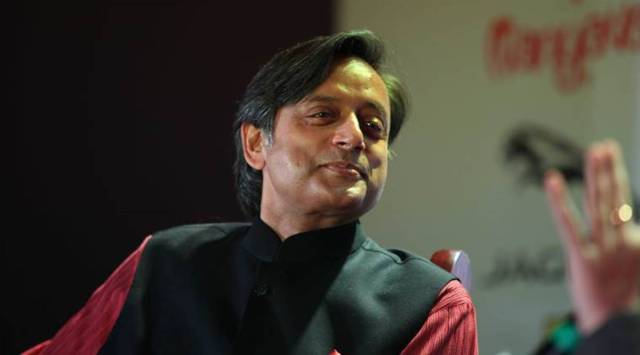Form Media Council with statutory powers: Tharoor-led IT panel to Govt
Parliament’s Standing Committee on Communications and Information Technology said the I&B ministry should encourage self-regulation in electronic media by the broadcasting industry.
 Congress leader Shashi Tharoor. (File Photo)
Congress leader Shashi Tharoor. (File Photo)Airing its displeasure over ethical standards in the media, Parliament’s Standing Committee on Communications and Information Technology, headed by Congress leader Shashi Tharoor, has recommended that the government set up a Media Council, on the lines of the Press Council of India (PCI), with statutory powers over print, television and digital media platforms.
In its report on ‘Ethical Standards in Media Coverage’, submitted to Parliament Wednesday, the committee said that current regulatory bodies like the PCI and the News Broadcasting Standards Authority are not as effective, that their “efficacy is limited” and the NBSA, a self-regulatory body, “depends on voluntary compliance with its orders”.
The committee said it is “of the firm opinion that PCI needs restructuring to cover all types of media” and the Union Ministry of Information and Broadcasting “should explore the possibility of establishing a wider Media Council, encompassing not just the print media but the electronic and digital media as well, and equip it with statutory powers to enforce its orders where required”.
This, the report stated, “would enable it to… take appropriate steps to check irregularities, ensure freedom of speech and professionalism, and maintain the highest ethical standards and credibility”.
It recommended that the government create a Media Commission comprising experts “for wider consultations amongst the interested groups/stakeholders to evolve a consensus in this regard” and till that happens, the I&B Ministry should “look into the possibility of expanding the regulatory framework to monitor e-newspapers”.
It said the Ministry should examine the matter to bring all private satellite TV channels under the mechanism of self-regulation, and “take steps to make the mechanism of self-regulation more effective”.
On the Information Technology (Guidelines for Intermediaries and Digital Media Ethics Code) Rules, 2021, against which several challenges have been filed in different courts across the country, including by several print and television media groups, the committee said it hopes that this “will go a long way in regulating digital media content” and the I&B Ministry and Ministry of Electronics and Information and Technology “will work coherently and in tandem to ensure that the code for ethics are followed by digital media also”.
It expressed “grave concern that media… is gradually losing its credibility and integrity where values and morality are being compromised” and there are “rampant instances of violations of code of conduct of ethics by the media reflected in the form of paid news, fake news, TRPs manipulation, media trials, sensationalism, biased reporting, etc”.
Quoting Ministry officials on a “discussion over having an umbrella statute for the entire broadcasting sector covering print, electronic and online media, which is under examination”, the committee asked the Ministry to look into it “expeditiously” to make “necessary amendments” to the Cable Television Network (Regulation) Act, 1995 “which is 25 years old, and needs changes”.
Discussing the limits of PCI’s ability to punish erring newspapers unless the Ministry’s Bureau of Outreach and Communications (BOC) steps in to block government advertisements for that newspaper, it expressed “utmost concern that the erring newspapers tend to repeat the same mistakes, even after being censured by PCI, till action is taken” by BOC.
“It is surprising to note that a lot of time is wasted in taking a decision by the BOC against such newspapers, which eventually dilutes the impact of the decision,” the committee said, exhorting the Ministry “to prescribe a certain time limit for BOC to take action on the cases censured by PCI, in the interest of maintaining and promoting high standards of press in India”.
The report expressed displeasure over the use of “Anti-national attitudes” in Rule 6 (1)(e) of the Cable Network Rules, 2014, as per which “no programme should be carried in the cable service which is likely to encourage or incite violence or contains anything against maintenance of law and order or which promote ‘Anti-national attitudes’.”
The term, it noted, has not been separately defined in the Programme Code in the CTN Rules, 1994. The Ministry, the report said, justified that “anti-national” is “commonly understood as opposed to national interests or nationalism” but the committee, unconvinced, said the term “may be the cause of unnecessary harassment of the private channels”. It recommended that “the term ‘Anti-national attitude’ be properly defined to remove any ambiguity in the interpretation of the term in the prescribed code”.
On the I&B Ministry banning two Malayalam-language news channels in March 2020 for their reporting on the Delhi riots by accusing them of “siding with one community”, the committee said “instead of taking recourse to due procedure in dealing with such complaints, prohibitory orders were issued against the channels with undue haste”.
Stating “it would be too harsh a decision to serve prohibitory orders against any channel without giving it ample opportunity to be heard as per the extant procedure before its act of violation of codes is established”, it said it trusts that the Ministry “in future would act in a transparent and impartial manner while dealing with such cases, lest such a decision on the part of the Government should be looked upon as a move to suppress the freedom of press”.








